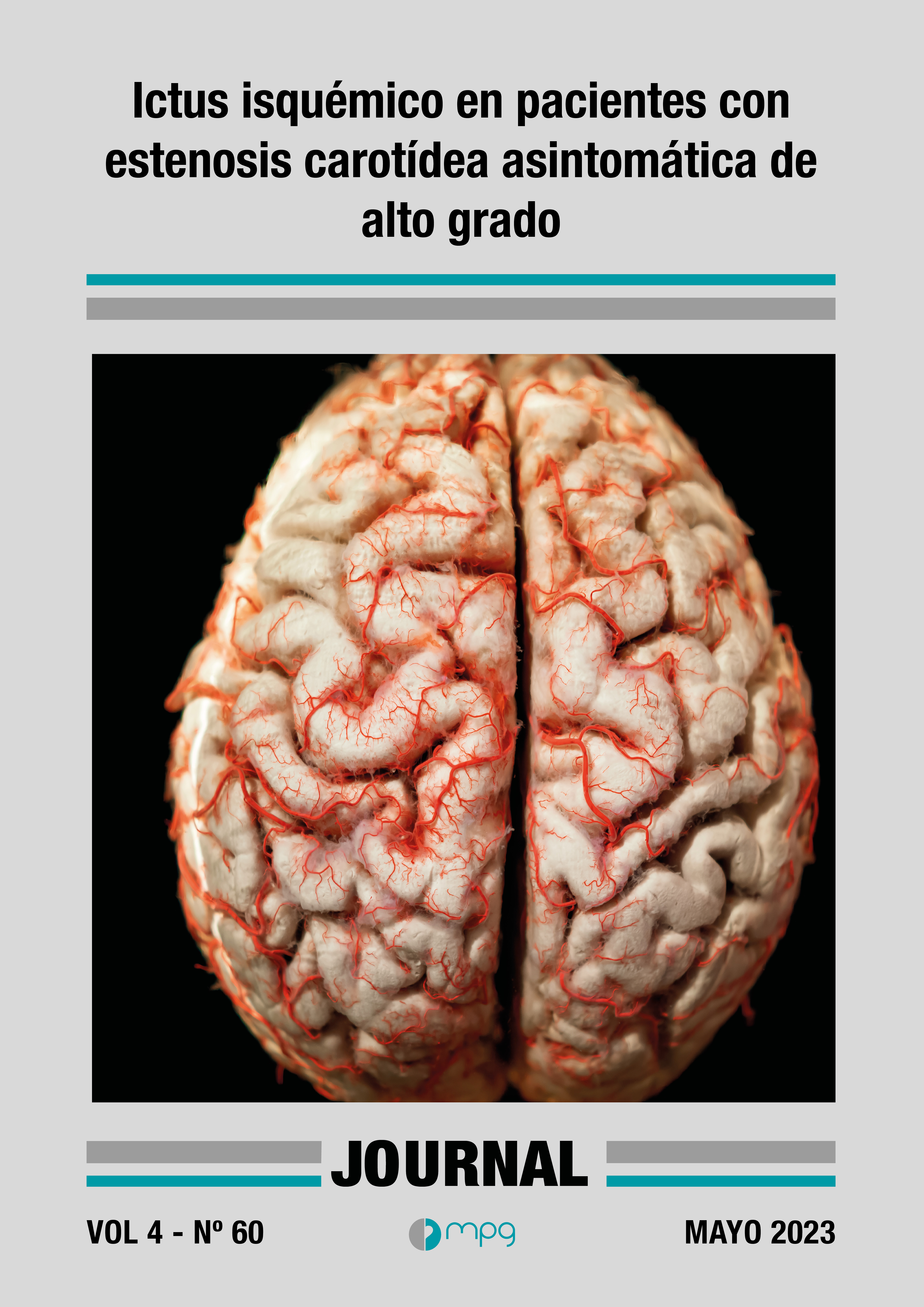10. Ictus isquémico en pacientes con estenosis carotídea asintomática de alto grado
Palabras clave:
Estenósis carotídea severa, Ictus esquémico, CirugíaResumen
La estenosis carotídea asintomática de alto grado representa un reto terapéutico. La decisión entre el manejo médico y quirúrgico exige una valoración cuidadosa del riesgo - beneficio. Se presenta un estudio poblacional en el que se analizó la incidencia de ictus isquémico durante un periodo de seguimiento de 4,1 años, que resultó del 4,7%. Este riesgo fue bajo en comparación con series previas, si bien se encontró una tasa de mortalidad elevada. Estos datos pueden contribuir a la toma de decisiones en pacientes con estenosis carotídea asintomática de alto grado.
Asymptomatic high-grade carotid stenosis represents a therapeutic challenge. The decision between medical and surgical management requires a careful risk-benefit assessment. We present a population study in which the incidence of ischemic stroke was analyzed during a follow-up period of 4.1 years, which was 4.7%. This risk was low compared to previous series, although a high mortality rate was found. These data may contribute to decision-making in patients with asymptomatic highgrade carotid stenosis.
- Recibido: 06 Abril 2023
- Revisión: 11 Abril 2023
- Aceptado: 05 Mayo 2023
Referencias
Vol 59 N4; págs. 956-967. 2014. Kakkos SK, Nicolaides AN, Charalambous I, Thomas D,
Giannopoulos A, Naylor AR, et al. Predictors and clinical significance of progression or regression
of asymptomatic carotid stenosis. Journal of Vascular Surgery.
Doi: https://doi.org/10.1016/j.jvs.2013.10.073
Vol 8 N19; pág 1271. 2020. Paraskevas KI, Nicolaides AN, Kakkos SK. Asymptomatic Carotid
Stenosis and Risk of Stroke (ACSRS) study: what have we learned from it? Annals of Translational
Medicine.
Doi: https://doi.org/10.21037/atm.2020.02.156
Vol 376 N9746; págs. 1074-1084. 2010. Halliday A, Harrison M, Hayter E, Kong X, Mansfield A,
Marro J, et al. 10-year stroke prevention after successful carotid endarterectomy for asymptomatic
stenosis (ACST-1): a multicentre randomised trial. The Lancet.
Doi: https://doi.org/10.1016/s0140-6736(10)61197-x
Vol 40 N10; págs. 573-583. 2009. Abbott AL. Medical (Nonsurgical) Intervention Alone Is Now
Best for Prevention of Stroke Associated With Asymptomatic Severe Carotid Stenosis: Results of a
Systematic Review and Analysis. Stroke.
Doi: https://doi.org/10.1161/strokeaha.109.556068
Vol 31 N13-14; págs.1711-1717. 2017. Rodolfo Pini, Gianluca Faggioli, Andrea Vacirca, Laura
Maria Cacioppa,Enrico Gallitto,Mauro Gargiulo & Andrea Stella. The fate of asymptomatic severe
carotid stenosis in the era of best medical therapy. Brain Injury.
Doi: https://doi.org/10.1080/02699052.2017.1346285
Vol 111 N5; págs. 970-7. 2009. Nagaki T, Sato K, Yoshida T, Yoshimoto Y. Benefit of carotid
endarterectomy for symptomatic and asymptomatic severe carotid artery stenosis: a Markov model
based on data from randomized controlled trials: Clinical article. JNS Journal of Neurosurgery.
Doi: https://doi.org/10.3171/2009.4.jns08568
Vol 20 N3; págs. 193-202. 2021. Howard DPJ, Gaziano L, Rothwell PM. Risk of stroke in relation
to degree of asymptomatic carotid stenosis: a population-based cohort study, systematic review,
and meta-analysis. The Lancet Neurology.
Doi: https://doi.org/10.1016/s1474-4422(20)30484-1
Vol 74 N6; págs. 1937-1947. 2021. Robert W. Chang, MD, Lue-Yen Tucker, BA, Kara A.
Rothenberg, MD, Elizabeth M. Lancaster, MD, Andrew L. Avins, MD, Hui C. Kuang, NP, et al.
Establishing a carotid artery stenosis disease cohort for comparative effectiveness research using
natural language processing. Journal of Vascular Surgery Surg.




MPG Journal - Política de privacidad